

Raddon Research Insights
Raddon researches the financial behaviors, intentions and attitudes of consumers nationwide.
Questions or requests for additional information and reports not listed below can initiated made here
February, 2025
The Deposit Mindset: How Consumers are Thinking about Savings & Investments
This report examines results from a recent Raddon survey of 1,500 individuals from across the U.S. that highlights the current need for savings products and education on products and services your institution offers. How can you not only set yourself apart from major financial institutions, but also share your similarities so your current and future account holders are aware of the plethora of services that are available to them? This Raddon Research Insights report emphasises that deposit products are not one size fits all, and different life stages and age groups are in need of products that fit them.
Price: $1,000
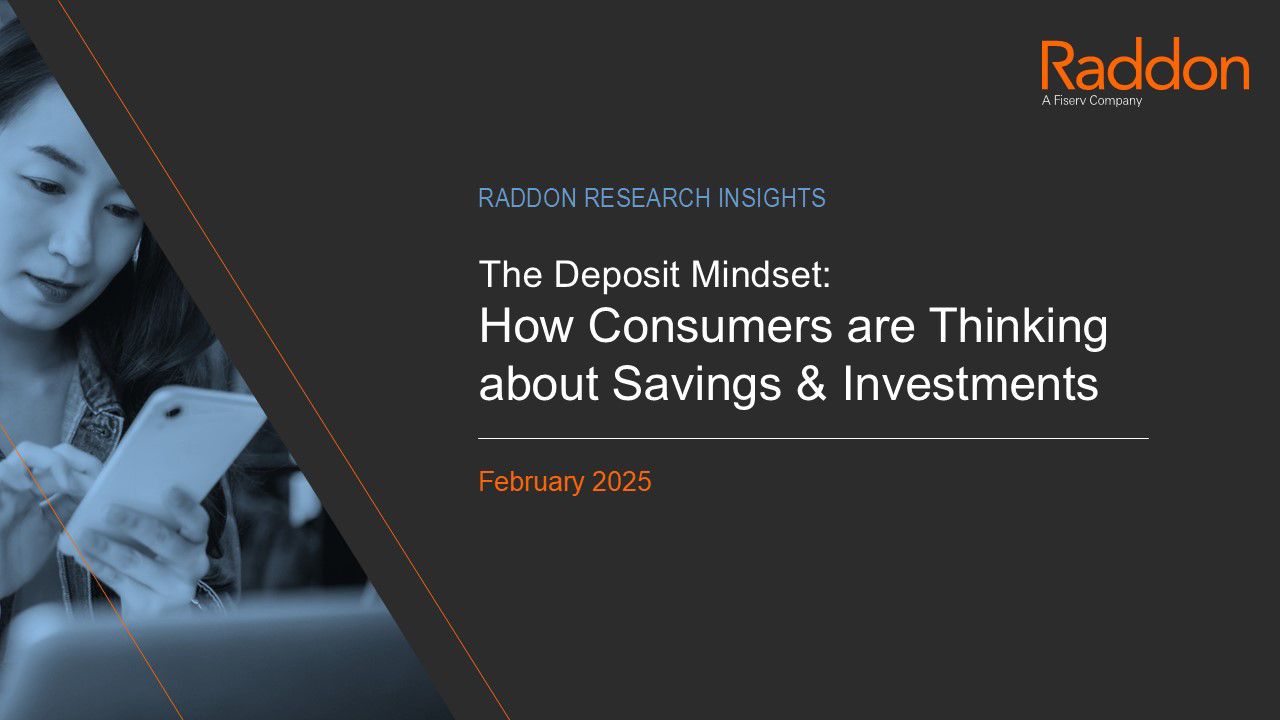
December, 2024
Decoding Gen Z's Banking Behavior
This report examines results from a recent Raddon survey of 1,500 individuals from across the U.S. that highlights Gen Z banking users. Discover how Gen Z is reshaping the banking landscape with their digital-first mindset and demand for personalized, value-driven services. This Raddon Research Insights report explores their unique preferences, financial challenges, and the strategies financial institutions need to win their trust and loyalty. Stay ahead of the competition by understanding how to connect with this influential generation.
Price: $2,000

November, 2024
High-Touch: Managing the Human Factor in the Digital Banking Era
This report examines results from a recent Raddon survey of 1,500 individuals from across the U.S. that highlights the high in-person banking users. Although we live in a predominantly digital era, we are still seeing that in-person branches are still important to many consumers. Whether you are wanting to see those new technological advancements within the branch, or are wanting to conduct a transaction or open a new account, there is still a need for the human factor when it comes to banking. Being able to showcase that you not only have an advanced online presence, but that you are able and willing to help consumers in-person is going to be important for attracting and maintaining accountholders.
Price: $2,000

November, 2024
High-Tech: Navigating the Digital Needs of Today's Banking Consumer
This report examines results from a recent Raddon survey of 1,500 individuals from across the U.S. that highlights the high-digital and tech users when it comes to their banking. While many consumers regardless of age are willing to utilize mobile and online banking, newer technologies and features are intriguing to younger consumers but you may find more skepticism with older generations. It is important to maintain a healthy balance of advancing your technology while still maintaining that human interaction. This report takes a deep dive in how you can market to different age groups and what is important to them when it comes to banking.
Price: $2,000
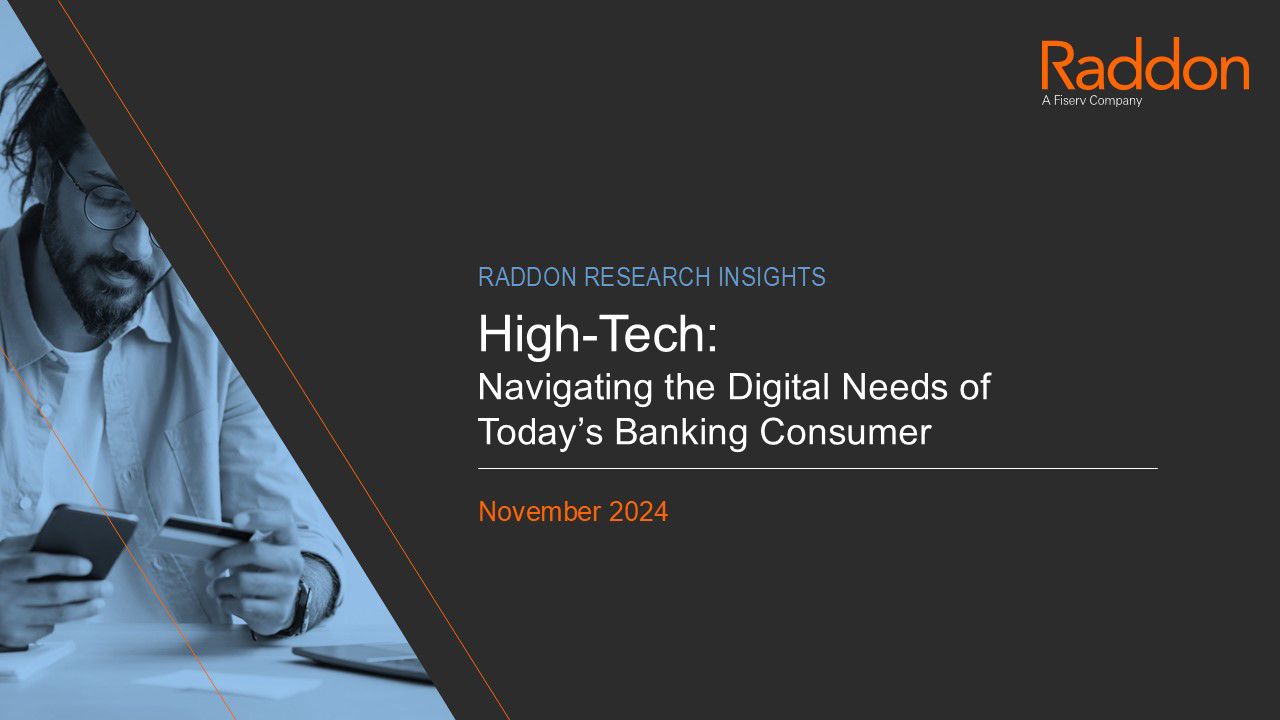
September, 2024
Payments and Delivery Insights: Redefining Banking in a Digital Age
This report provides an in-depth look at the latest payments and delivery channel trends, highlighting the need for financial institutions to continue evolving to meet the needs and expectations of today’s consumers. As consumer preferences shift, understanding these dynamics is crucial for financial institutions aiming to optimize their services and enhance accountholder satisfaction. This research examines generational differences in digital and branch usage, explores self-service banking trends, and dissects consumer preferences regarding payment methods and account features.
Price: $1,000
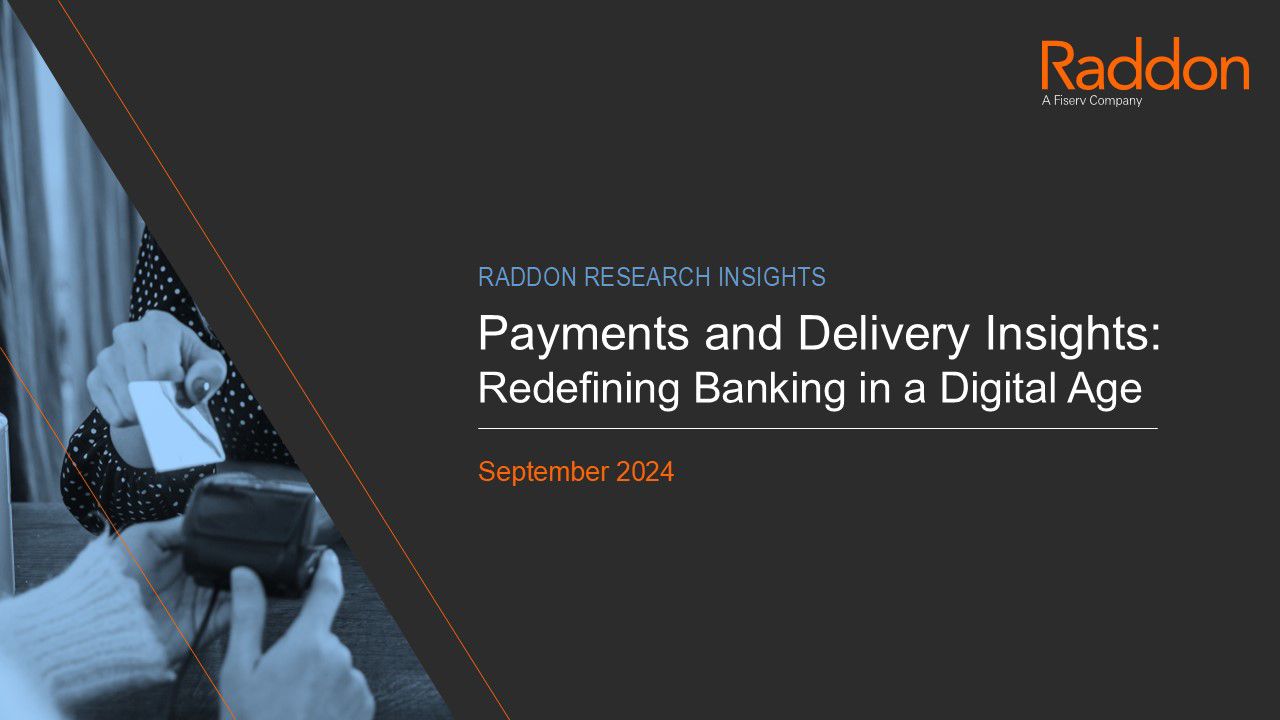
July, 2024
Raddon Research Insights: Economic Outlook and Consumer Perceptions
This report examines results from a recent Raddon survey of 1,500 individuals from across the U.S. that revealed a disconnect between the average consumer and professional economists in regard to the state of the economy. The report highlights consumers’ struggle with student loans, inadequate savings, rising debt levels, inflation, and home affordability. For financial institutions, being able to develop and market products and services that help address consumers’ specific challenges can help differentiate you from competitors.
Price: $2,000
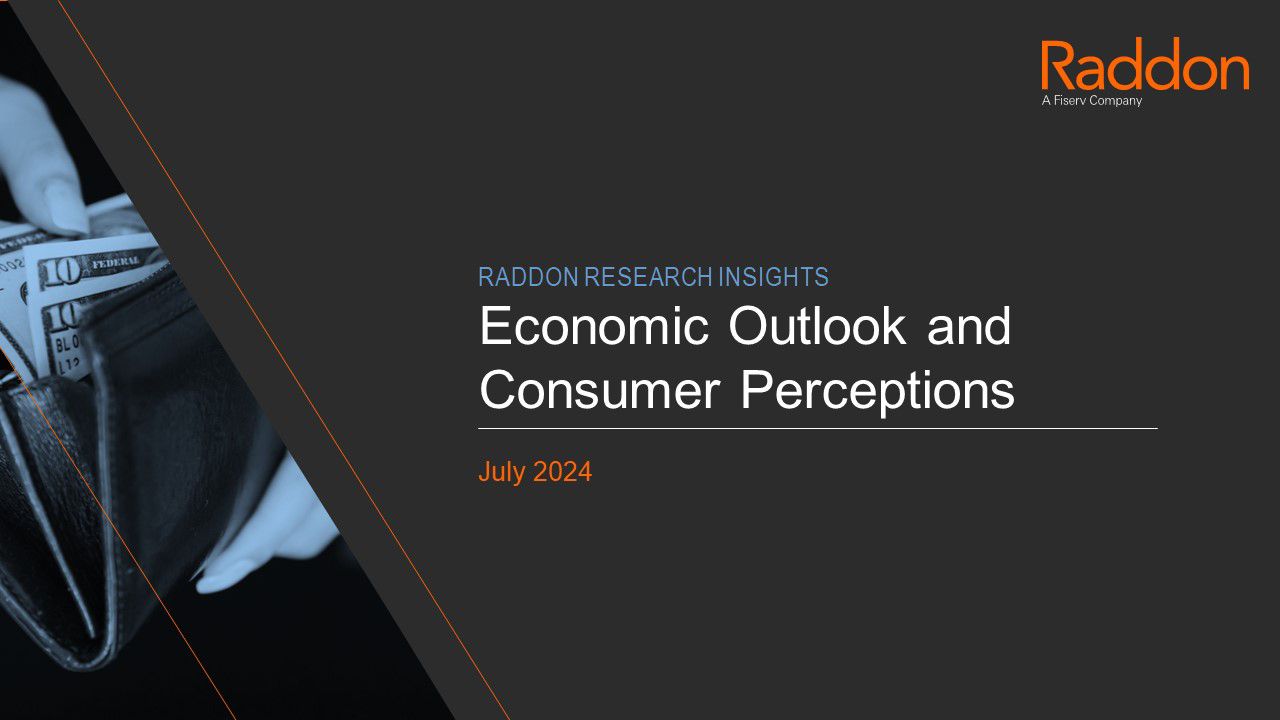
July, 2024
Lending Insights: Tough Sledding Ahead for Borrowers and Lenders
This report examines key trends in consumers’ lending behaviors and attitudes towards debt. Our findings show a growing percentage of borrowers are facing challenges with their debt obligations amid an environment marked by higher interest rates and higher rates of inflation. Overall, consumers are also signaling a declining appetite to take on more debt, though a segment of the population has become increasingly dependent upon debt to fund their day-to-day lives. In this study, we highlight how lenders can uncover growth opportunities in a challenging loan market, and build stronger relationships with accountholders by helping them manage their debt obligations.
Price: $1,000

March, 2024
Deposits and Investments: It's Time to Start the Conversation of Retirement
While many financial topics of discussion are saved for when you reach a certain age, it is important to understand that conversations around retirement and investments do not have an age limit. With economic uncertainty among a wide range of demographics, let’s kick start the conversation and help educate and advise consumers on their financial future. With a focus on retirement, this report examines deposit behaviors among consumers within the last 12 months.
Price: $1,000

December, 2023
Marketing to the Modern Consumer: Security Versus Relevancy
This report examines current marketing trends and how differing generations view them. While there is a push to cater toward younger generations, it is important to remember that people of all ages need banking services. It is up to the financial institution to be able to provide marketing materials that can cater to differing ages across different platforms depending on the audience you are trying to reach. Finding a balance between security and relevancy is key.
Price: $2,000

October, 2023
Evolving Generational Needs: Adapting to the Future
As technology is constantly changing and adapting, so are our younger generations. Given that older Gen Z and Millennials born in the 1990s are mostly digital natives, it is crucial for financial institutions to continually adapt to cater to their requirements and assist them in their financial goals. With a focus on evolving needs, this report examines the changes in behaviors between those in their twenties and thirties today compared to those in that age rage 10 years ago.
Price: $2,000
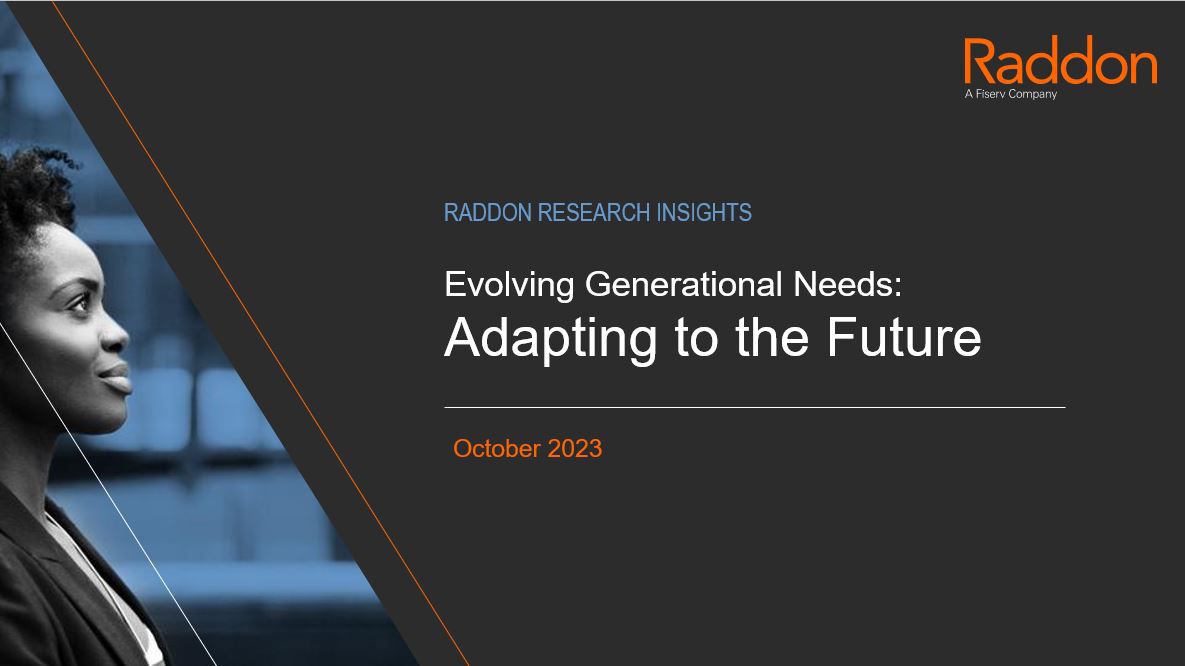
September, 2023
Small Business Insights: Unleashing the Opportunity
As small businesses navigate today’s rapidly evolving financial landscape, financial institutions need to understand this segment’s needs and expectations in order to strengthen market share and deepen relationships. With a focus on understanding the evolving dynamics of the market, this report examines the unique challenges faced by small business owners and their expectations from banking institutions.
Price: $1,000

June, 2023
Evolving or Extinct: The Urgent Need for Financial Institutions to Adapt
This report uncovers the latest changes in consumer banking expectations, behaviors, and preferences when it comes to delivery and payment methods.
Community Banks and Credit Unions looking to build relevance with Millennial and Gen Z accountholders will find examples of how to adapt and meet their evolving expectations.
Price: $2,000
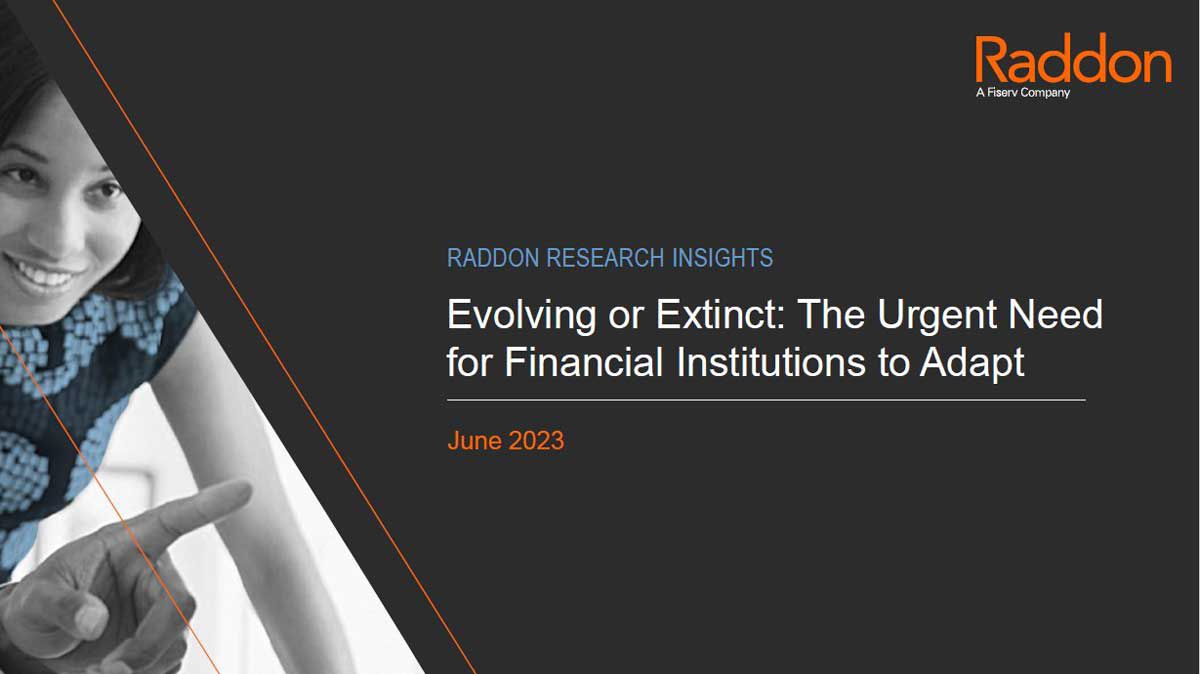
April, 2023
Lending Insights:
Post-Pandemic Pressure Builds
This report examines trends in borrowing behavior, from concerns in the general economy to student loans on the rise and explains how to deliver on new borrower expectations and needs to avoid loan application abandonment.
Price: $1,000

February 2, 2023
Deposits and Investments: Being the Trusted Advisor
Our research takes a look at consumer behavior toward selecting a primary financial institution, rate tracking, saving for the future, and why they need YOU as their trusted advisor.
Price: $1,000

November 3, 2022
FINTECHS: Passing Fad or Game-Changers?
This report investigates eight fintech sectors: payments, “Buy Now, Pay Later” (BNPL), investing, banking and personal finance, cryptocurrency, budgeting, borrowing, and family and teen banking. The research takes a deep dive into each segment, helping financial institutions determine where and how to compete.
Price: $2,000

August 9, 2022 | Caroline Vahrenkamp
Gen Z and Their Parents: Preparing for the Financial Future
This report examines how confident Gen Zers and their parents feel about financial education, what both parties need to be successful and where they turn for help. Financial institutions (FIs) that prepare kids to be financially responsible can satisfy the demands of two generations and help build lifelong financial relationships.
Price: $2,000
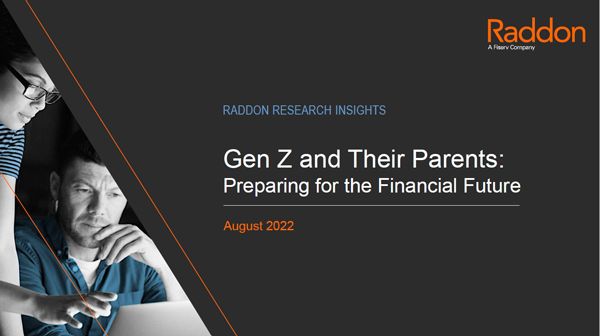
June 7, 2022 | Caroline Vahrenkamp
The Battle for Talent
Workers are seeking higher pay and more flexibility. These top two reasons for changing jobs align with two fundamental needs: having enough money to pay for bills and knowing that we are cared for. As inflation continues, the need for enough money to cover expenses will increase, which is why we will continue to see higher than average quit rates as people seek new, higher-paying jobs.
Price: $1,000

March , 2022 | Caroline Vahrenkamp
Payments and Delivery Insights:
The Changes Continue
Some payments and delivery activities have bounced back, but not to prepandemic levels. And they probably will not. This report explains how banking behavior has shifted since the pandemic and among different generations and demographics. It also includes strategies to help financial institutions evolve products and services to match consumers’ changing needs.
Price: $1,000
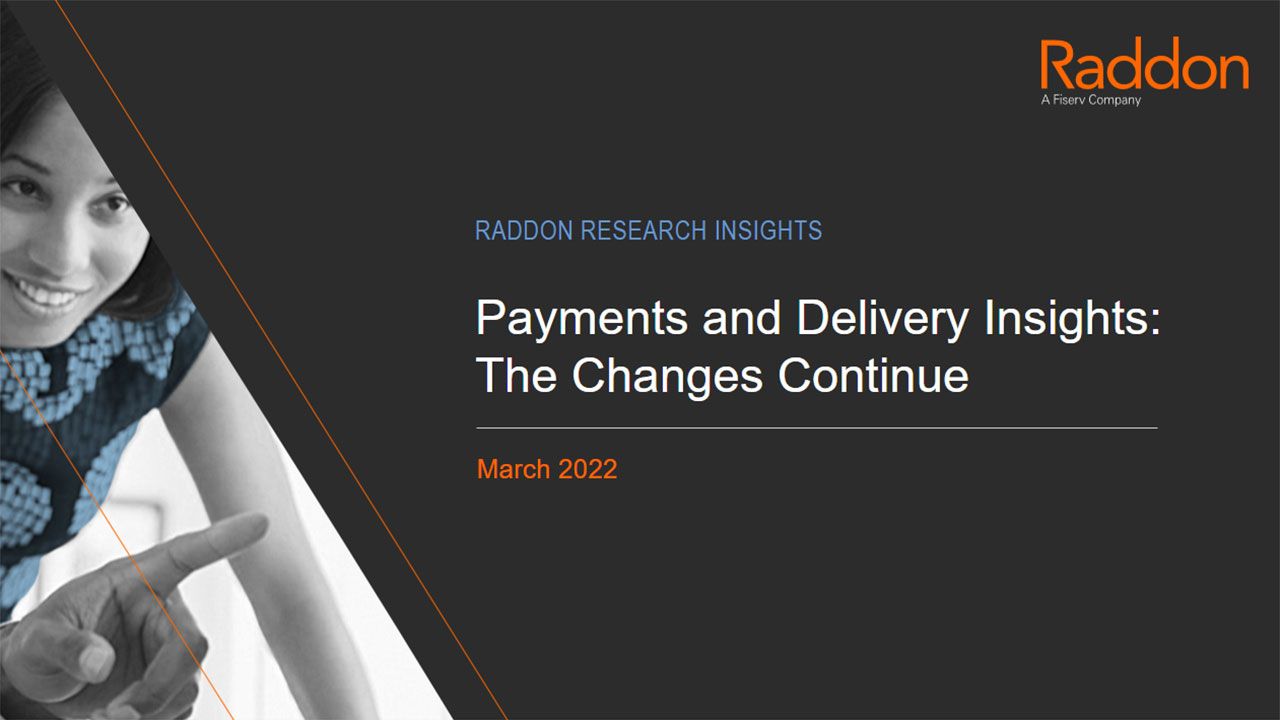
February 22, 2022 | Caroline Vahrenkamp
Lending Insights: The Rise of Buy Now, Pay Later
Buy Now, Pay Later (BNPL) schemes are exploding, with nontraditional lenders dominating the market. Younger consumers are excited for more convenient and mobile-friendly ways to stretch their budgets. This report examines trends in borrowing behavior, like BNPL, and explains how to deliver on new borrower expectations and needs.
Price: $1,000

January 25, 2022 | Marcus Rothaar
Small Business Insights: Expansion and Opportunity
Over 60 percent of small businesses said they expect sales to increase over the prior year, but many will need external financing to fuel future growth. This report explains how financial institutions can help small businesses improve their financial situations and secure much-needed financing. Financial institutions’ technology and digital tools will continue to play an increasingly significant role in attracting the next generation of small business owners. Learn which products and services attract small businesses, ease their stress and strengthen relationships.
Price: $1,000
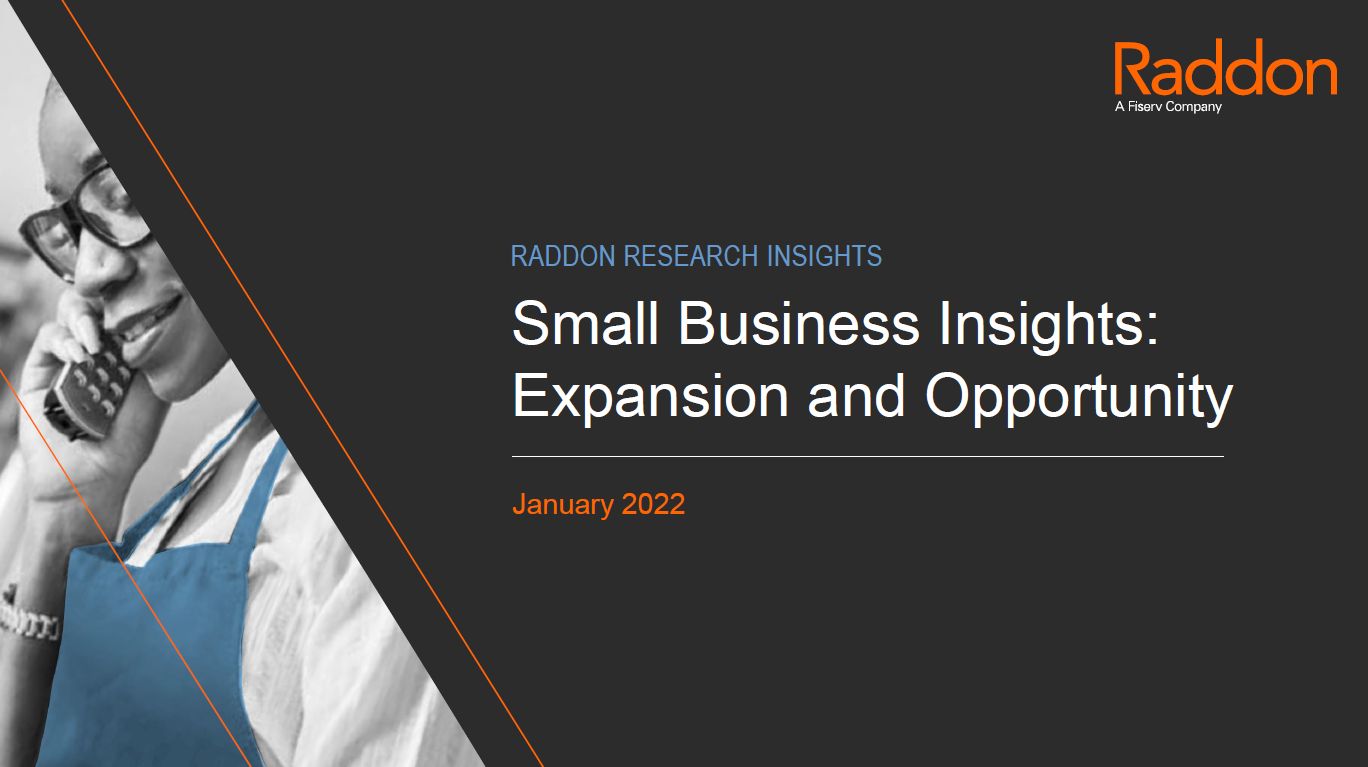
October 29, 2021 | Caroline Vahrenkamp
Deposits and Investments Insights: Into the New Frontier
Rate sensitivity peaked in 2020 with 68 percent of consumers willing to move funds for a 1 percent increase. While rate sensitivity is declining, the search for better returns helped drive a dramatic increase in non-retirement investing. This report examines deposit and investment trends to help financial institutions develop the right products and features for the right consumers. We also measured awareness, demand, and usage for emerging and alternative investment technologies, such as investing apps and cryptocurrency. With this information, banks and credit unions can attract and retain loyal accountholders and help their balances grow.
Price: $1,000

September 30, 2021 | Caroline Vahrenkamp
Branch Evolution: How Has the Pandemic Changed Branching?
Since the pandemic, consumers’ motivations for branching have changed. Pre-pandemic, millennials largely viewed branches as transactional locations. Now, they turn to branch staff for financial advice. Believe it or not, millennials are using branches more – and older generations are going digital. This report revisits research Raddon conducted in January 2020, just before the COVID-19 pandemic disrupted life and banking as we knew it. By re-issuing the study, we compared how consumers of all generations viewed and used branches before and after the pandemic. We also learned which pandemic-driven changes could be here to stay and offer insight into strategies and features branches need to serve all accountholders well.
Price: 2,000

August 31, 2021 | Caroline Vahrenkamp
Moving Money Around: The New Payments Revolution
More and more consumers are now using their cards to make purchases and pay bills digitally – without touching the actual card. Digital payments include use of bill-pay services, person-to-person (P2P) apps like PayPal and Venmo, stored value accounts like Amazon and Starbucks, and mobile payments like Apple Pay and Samsung Pay. Most consumers have one card linked to those payment methods. A successful financial institution must motivate consumers to choose its card as that one card. This study seeks to understand consumer payment perceptions and behaviors, including the payments consumers make, the cards they use and the new technologies shaking up the industry.
Price: $2,000

June 29, 2021 | Caroline Vahrenkamp
Why Are Millennials and Gen Z Gravitating to the Big Banks?
For decades, American retail banking has revolved around the baby boomer generation. But now, based on 2020 Census data, boomers are the minority cohort. Younger generations have overtaken boomers – and overwhelmingly moved their business toward the largest banks. Seventy percent of millennial and Gen Z consumers claim a large bank as their primary financial institution (PFI). This study examines demographic elements of the new predominant generations to understand the shift and to determine whether they can be convinced to switch to smaller institutions.
Price: $2,000

May 5, 2021 | Caroline Vahrenkamp
How Consumers Use Credit Cards and Delivery Channels: A New Perspective
Financial institutions have developed an increasingly complex web of ways to interact with their accountholders. Drawing upon Raddon’s history of identifying and analyzing market segments, this study gives a new perspective in how consumers use credit cards and delivery channels, identifying how those preferences determine balances, product selection, loyalty, and more.
Price: $1,000

March 29, 2021 | Greg Ulankiewicz
Lending Insights: If You Build It, They Will Borrow
When efforts to mitigate the COVID-19 pandemic halted economic activity, consumer loan demand and application activity skyrocketed. Financial institutions will be managing these effects for some time since higher loan demand could linger for several years. Join us as we review the findings from the current Raddon Research Insights report which explores how lending activity changed during the pandemic by comparing findings from two consumer borrower surveys: February 2020 and August 2020.
Price: $1,000
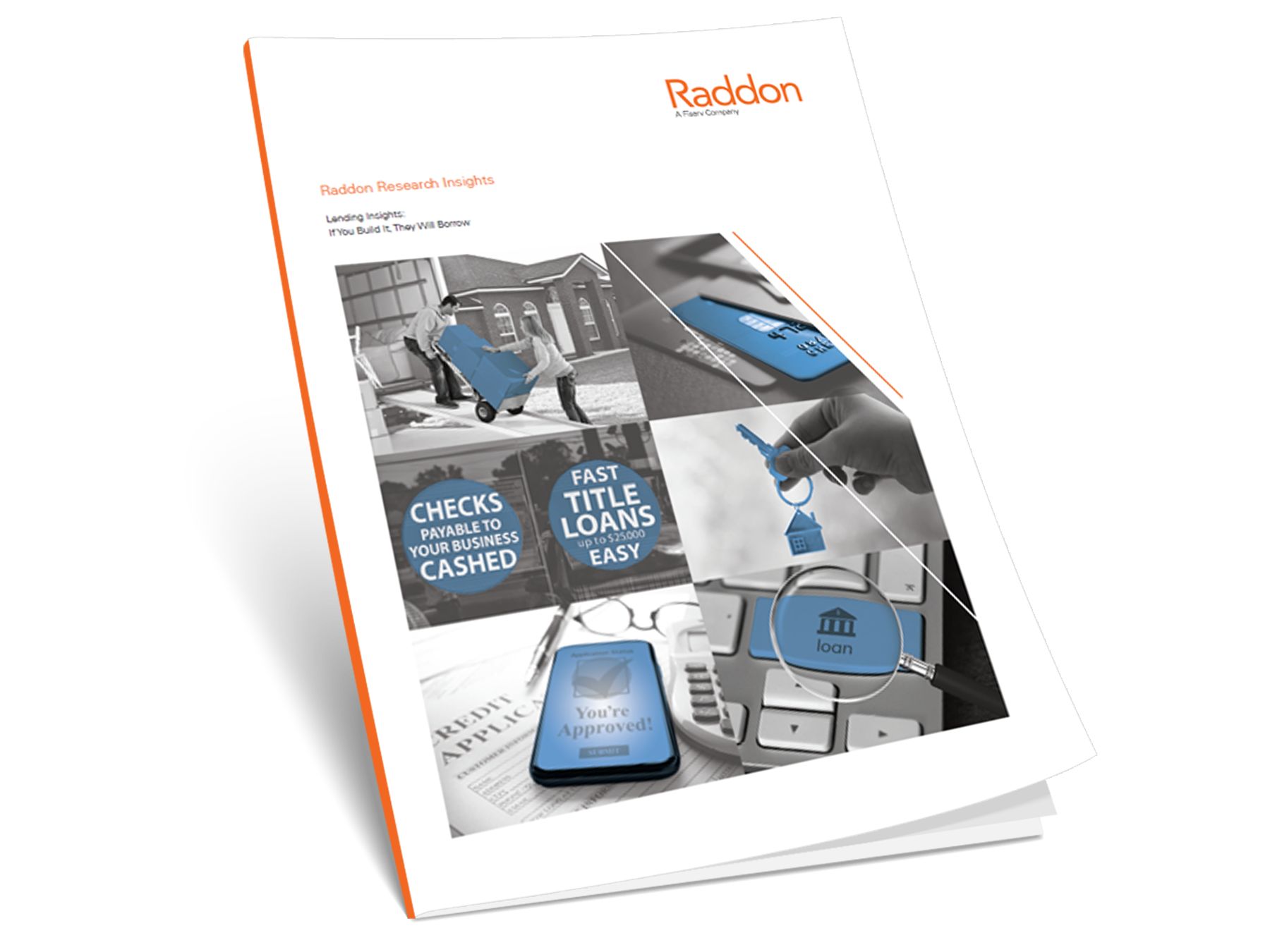
February 24, 2021 | Lynne Cornelison
Delivery Insights: Changing Demands in a Contactless World
When interacting with their financial institutions during the COVID-19 pandemic, either through delivery channels or payments, consumers quickened their transition to digital channels. Behaviors that had been steadily trending upward, like the increase in digital and online banking, accelerated during the pandemic.
Delivery Insights: Changing Demands in a Contactless World explores how consumers’ attitudes, perceptions and banking habits have changed over the years and in context of the global health crisis. In this report, Raddon investigates how those behavioral changes (and the pace of change) may affect future banking.
Price: $1,000
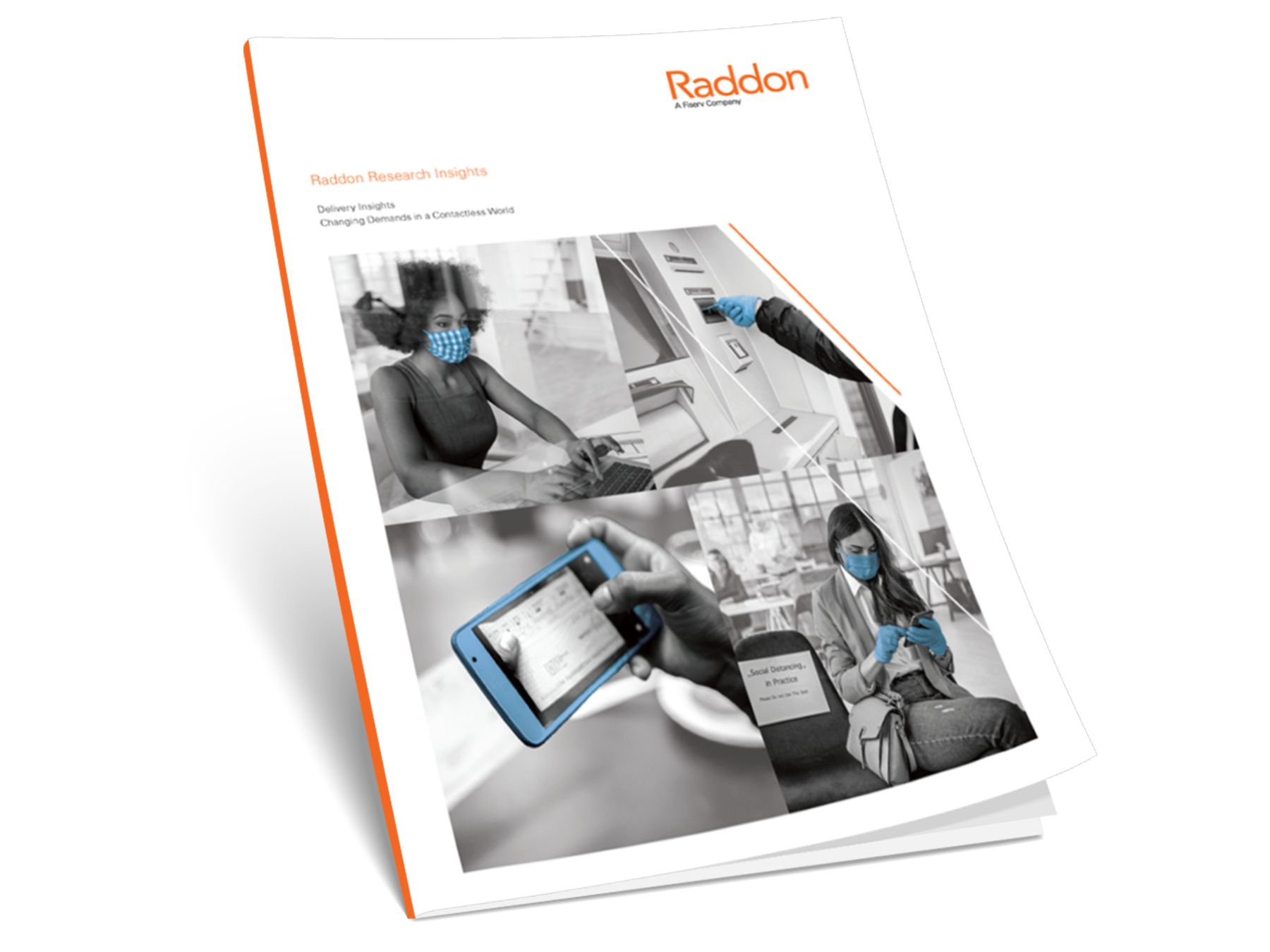
January 28, 2021 | Marcus Rothaar
Supporting Small Businesses During COVID-19
The COVID-19 pandemic has caused turmoil and disruption to small businesses. Amid lockdown orders and shifts in consumer behavior, many small businesses have shifted to survival mode and are fighting to keep their doors open. Financial institutions have played a critical role in helping small businesses navigate the pandemic. This study explores the challenges and difficulties small businesses are facing during the pandemic and ways in which financial institutions can make a meaningful difference for small businesses now and create long-term loyalty among small business accountholders.
Price: $1,000

November 24, 2020 | Caroline Vahrenkamp
Deposits Insights: Rise of the Millennial Saver
The twin blows of the fallen rate environment and the COVID-19 pandemic have rocked the savings world. Consumers, primed by need and falling rates, have become far more rate sensitive and open to moving funds than any time in recent history.
Institutions now face a margin crunch to go along with retention risk. Navigating rising consumer expectations will require a keen understanding of the most rate-sensitive populations. This study, conducted several months into the pandemic, considers how consumers have managed their savings in light of the pandemic and the rate environment
Price: $1,000

October 30, 2020 | Caroline Vahrenkamp
The 2020 Challenge: Primary Status and Demographics in the New Decade
The COVID-19 pandemic has continued to put pressure on the U.S. consumer, impacting their banking behavior and expectations. Among the changes has been a hastening of already existing trends, like the transition to mobile banking. Oher changes are more subtle, like how consumers select a primary financial institution (PFI).
This study seeks to understand how consumers determine their relationship with their PFI and how the evolving demographics of 2020s U.S. should change how financial institutions approach consumer segmentation.
Price: $2,000
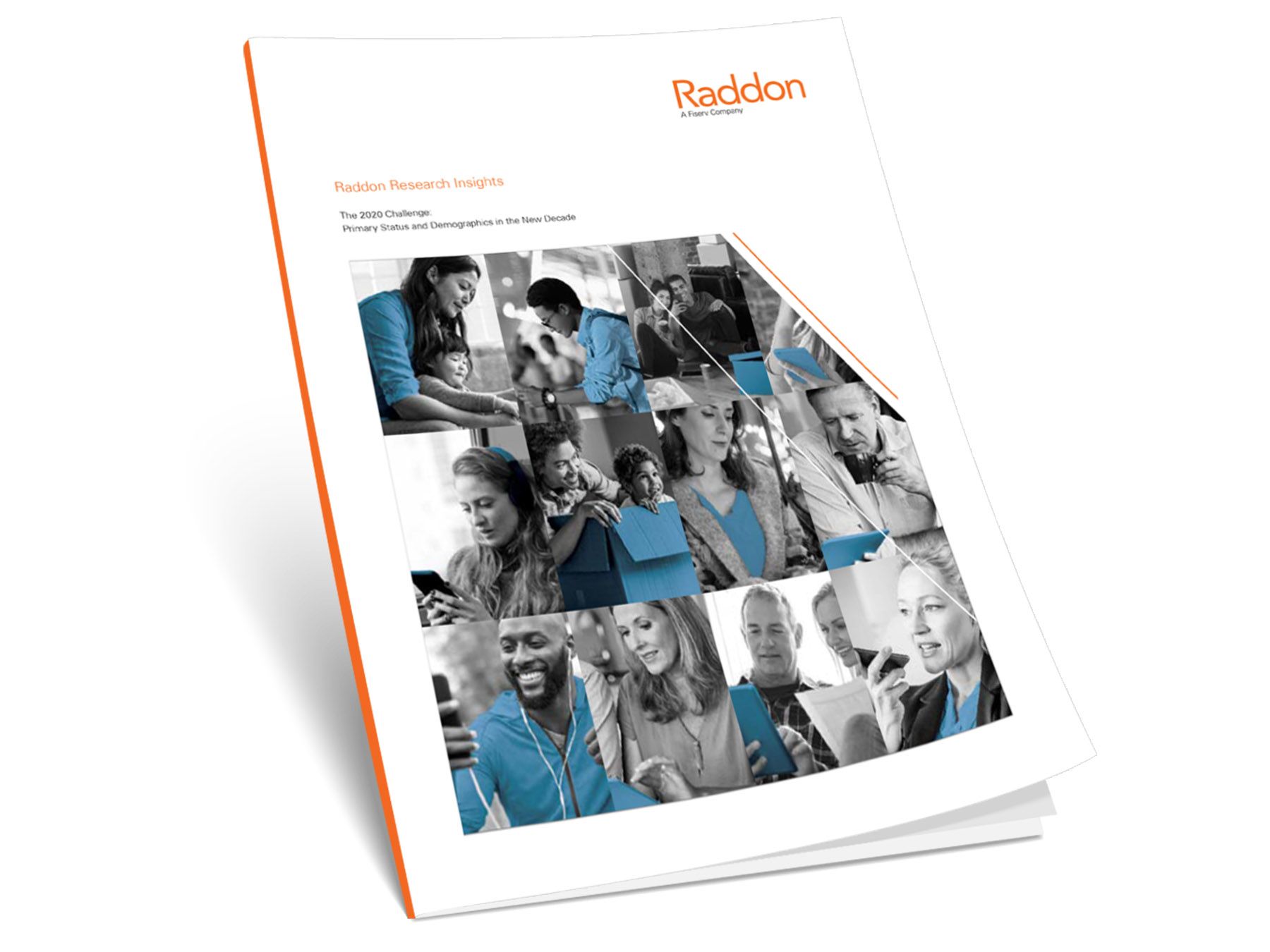
September 1, 2020 | Greg Ulankiewicz
Borrowing From Experience: Building a Better Loan Process
Borrowing From Experience: Building a Better Loan Process examines the loan application process through the lens of the borrower.
Based on feedback from borrowers’ most recent loan application experience, this 42-page report identifies points of friction in the loan application process. The findings demonstrate how different segments of borrowers rate the application process and how the experience differs across products and channels in terms of the time and steps to completion. Armed with this knowledge, this study will help lenders form a cogent strategy for driving loan growth through improved loan application processes.
Price: $2,000

August 5, 2020 | Caroline Vahrenkamp
Stress and Solutions in a Pandemic Age
The latest Raddon Research Insights study, Financial Health: Stress and Solutions in a Pandemic Age, examines the financial stresses that American consumers feel as the COVID-19 pandemic rages.
While most consumers believe their financial health is sound, in many cases, they face immense levels of financial stress. In this study, Raddon explores a harrowing picture of financial health for younger consumers in particular, but we hope to offer a road map for financial institutions looking to bolster the wherewithal of their consumers.
Price: $2,000

April 9, 2020 | Caroline Vahrenkamp
Branch Transformation: Building for the Next Generation
Branch Transformation: Building for the Next Generation, explores how consumer affinity for branching is changing and what models and features look to drive traffic in the 2020s.
COVID has shut down many financial institution branches, but the virus has only hastened the transition consumers had already begun to make. While branches will still fill a vital role in the future, evolving expectations by new customers will put pressures on them to adapt. This 49-page study examines explores the changing role, availability and appearance of bank branches as new generations and new technologies redefine them.
Price: $2,000
March 18, 2020 | Greg Ulankiewicz
Lending Insights: The Future is Now
Lending Insights: The Future is Now examines the landscape of lending in the 2020s, and beyond.
The latter portion of the 2010s, 2019 in particular, ushered in some notable developments that are poised to profoundly reshape lending in the 2020s and beyond. This 25-page study examines two key tenets of this emerging loan transformation, product flexibility and process simplicity. These changes revolutionize the interaction between borrower and creditor, and soften the distinction between product categories. With these trends in mind, this study looks ahead at what the future of lending might entail.
Price: $1,000
February 18, 2020 | Lynne Cornelison
Payments & Channels Insights: Seeking a Seamless Experience
Payment and Channel Insights: Seeking A Seamless Experience explores the latest in consumer behavior and their interactions with their financial institutions.
As consumers embrace digital in almost every aspect of their lives, they haven’t completely abandoned in-person communications through visits to a brick and mortar site. This 45-page study examines the task financial institutions are faced with, to successfully meet the financial needs of customers at various stages in their financial lives, regardless of whether those needs are met through in-person, online, or mobile products and services.
Price: $1,000
January 24, 2020 | Marcus Rothaar
Small Business Insights: Expanding Your Reach
Small Business Insights: Expanding Your Reach, explores the latest in small business behavior and expectations.
While small business optimism remains relatively high, many small businesses are hesitant to take on additional debt, and are sticking with familiar financial institutions, even when others may offer better opportunities for loans, lines of credit, and enhanced checking and deposit account services. To expand their reach into this business demographic, financial institutions need to understand what motivates owners when making financial decisions for their small business. This 39-page study examines how owners manage the difficulties of running their businesses, from finding the easiest routes to loan approval to making the decision to venture into mobile banking or not.
Price: $1,000
January 9, 2020 | Caroline Vahrenkamp
Deposit Insights: Rate-Seeking Roller Coaster
Deposit Insights: Rate-Seeking Roller Coaster explores the latest in consumer behavior and expectations when using deposit products.
Rates rocketing up and then plummeting down have heightened consumer activity and rate sensitivity. Opportunities remain for financial institutions to differentiate their deposit offerings. This 32-page study examines how banks and credit unions can succeed in a war for deposits, with particular focus on the rising importance of mobile offerings and product design.
Price: $1,000
November 19, 2019 | Jane Handel
Generation Z: The Touchscreen Generation
Generation Z: The Touchscreen Generation, examines how this generation’s unique experience growing up amid the rapid evolution of personal technology and the resulting surge in accessible information have shaped their preferences as consumers, especially in the financial services sphere.
This 52-page study investigates how Gen Z uses financial services and how that behavior has changed since Raddon’s last study in 2017. It also explores how as this younger generation comes of age, financial institutions will have to adapt to changing expectations to capture Gen Z’s business.
Price: $2,000
October 15, 2019 | Caroline Vahrenkamp, Elizabeth Oeltjenbruns
Employee Engagement: How to Build Loyalty and Your Brand
Employee Engagement: How to Build Loyalty and Your Brand investigates what motivates employees. In today’s financial services industry, employees have become the key source of an institution’s competitive advantage. The cost of disengagement in the workplace can translate into lost productivity, turnover, absenteeism and accidents.
This 60-page study examines what factors motivate employees across all industries nationally, from compensation to training, management to sales culture, and then compares those results to those of financial institution employees. Finally, we give strategic recommendations for engaging your employees.
Price: $2,000

August 14, 2019 | Caroline Vahrenkamp
Baby Boomers and Retirement: Ready or Not?
Baby Boomers and Retirement: Ready or Not?, examines how prepared the Boomer generation is for the next phase of their life.
Consistently, Boomers underestimate what they will effectively need to save to afford a retirement that maintains their quality of life. This 42-page study examines the value of financial planning, the segments of Boomers who are more or less prepared, and what financial institutions can do to help their customers navigate retirement.
Price: $2,000

May 30, 2019 | Lynne Cornelison and Caroline Vahrenkamp
Money on the Move: Mobile Banking Usage and Preference Trends
Money on the Move: Mobile Banking Usage and Preference Trends, analyzes today’s mobile banking growth, what impacts mobile banking adoption, and the tools and features mobile bankers most value.
Financial institutions will be intrigued to learn how mobile banking impacts the relationship they have with their customers. Money on the Move investigates variances in mobile banking with generation and consumer segments, as well as whether increased mobile banking leads to increased loyalty or cost savings in delivery channels.
Price: $2,000

May 6, 2019 | Caroline Vahrenkamp
Building a Better Product: Tradeoffs in Designing for Consumer Preferences
Building a Better Product: Tradeoffs in Designing for Consumer Preferences, explores the product features that consumers prefer when evaluating key banking products.
Financial institutions often compare their product suite to their competitors, to understand how they fit on the supply side of the market. This 36-page study examines the demand side: when faced with a tradeoff – rate vs rewards, convenience vs no minimum balance – which attributes actually move the needle for consumers?
In addition to the study, you will receive our Product Demand Analyzer, a unique spreadsheet tool which makes the findings of the study actionable for your institution. The analyzer will let you compare your products to those of your competition to see how they perform among different segments.
Price: $2,000

March 6, 2019 | Marcus Rothaar
Small Business Insights: Looking for Easier Banking
Small Business Insights: Looking for Easier Banking, investigates the changing behavior and expectations of small businesses to help financial institutions effectively attract and retain this key segment.
As small businesses remain optimistic about their opportunities for improved sales and business growth, savvy financial institutions will use this as an opportunity to partner with and sell products and services that make banking easier, and ultimately help small businesses succeed. This 42-page study examines the current climate for loans, checking accounts, online and mobile banking, and other financial products geared to small businesses, pointing out areas where banks and credit unions may be able to increase their market share.
Price: $1,000

February 19, 2019 | Caroline Vahrenkamp, Lynne Cornelison, Bill Handel
Payments and Channels Insights: The Continuing March Toward Mobile
Payments and Channels Insights: The Continuing March Toward Mobile, investigates consumers' changing behavior and expectations when spending and transacting.
Smartphones are becoming universal, and an increasing number of consumers are using them for accessing their financial institution and for spending their money. Banks and credit unions are adapting to this changing environment. This 44-page study examines how financial institutions can capture their customers' transactions while adapting their delivery to meet new expectations and realities.
Price: $1,000
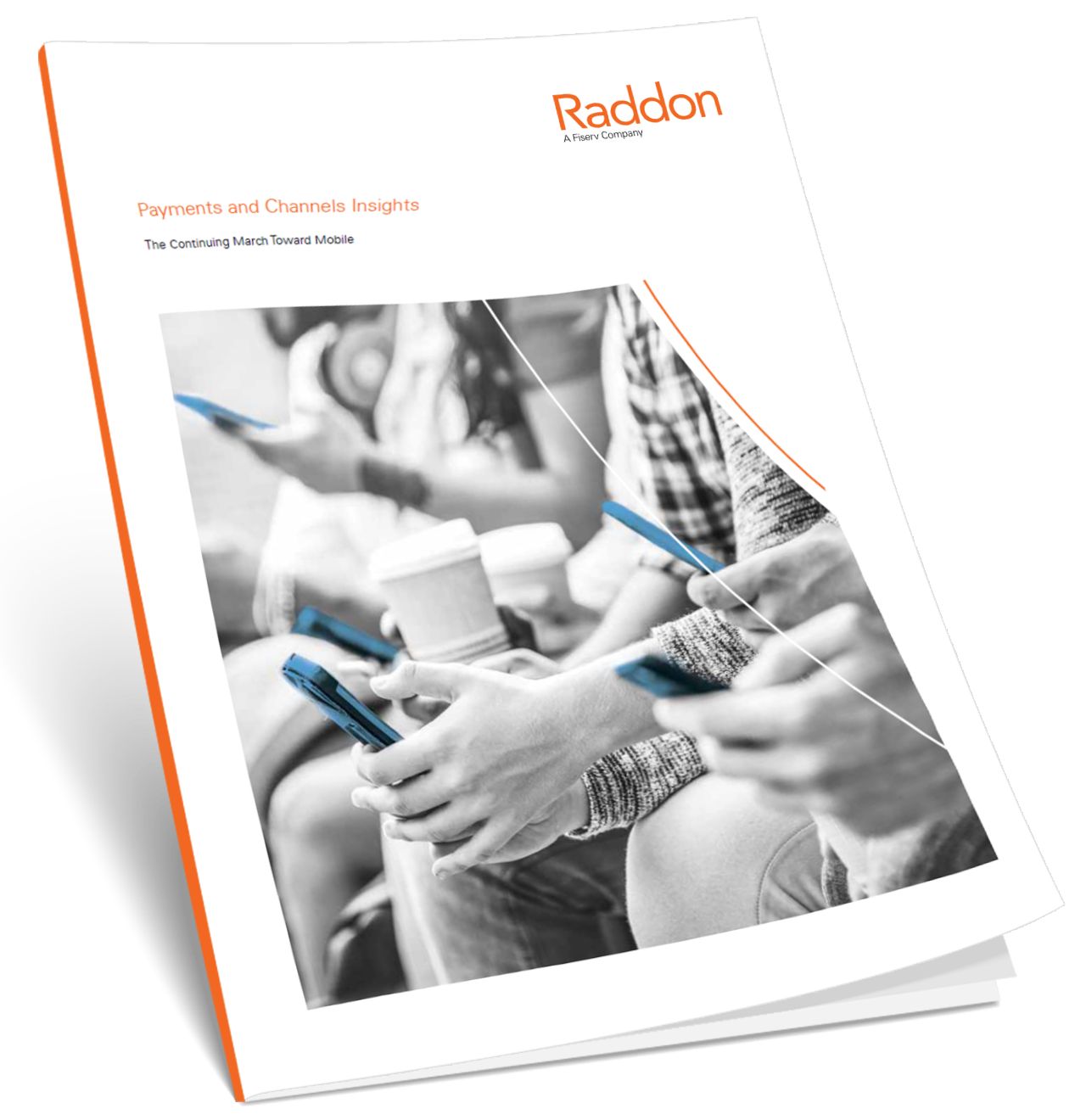
January 30, 2019 | Greg Ulankiewicz
Lending Insights: Headwinds on the Horizon?
While rising rates have inspired depositors, borrowing demand has begun to slip from post-recession highs in 2017. Financial institutions can still find lending opportunities, especially from Millennials in their prime borrowing years. This 31-page study examines how banks and credit unions can maintain lending growth and gives strategic and tactical recommendations to acquire loans despite the rate environment.
Price: $1,000

January 16, 2019 | Caroline Vahrenkamp & Karen Kislin
Deposit Insights: Ready to Put Money to Work
Rising rates have woken depositors from a long slumber, and expectations of earning more have grown. Opportunities remain for financial institutions to differentiate their deposit and investment offerings. This 46-page study examines how banks and credit unions can succeed in a war for deposits and gives strategic and tactical recommendations to capture dollars while maintaining margins.
Price: $1,000

October 29, 2018 | Caroline Vahrenkamp
Self-Drive My Car: Buying and Financing in an Uber World
Self-Drive My Car: Buying and Financing in an Uber World, investigates how changing technology will impact consumer behavior for buying and financing cars and what those changes mean for financial institutions.
Auto financing is a critical part of many financial institutions’ lending business, yet long-term trends in technology and consumer behavior will continue to decrease demand for new purchases, while competition only increases.
This 38-page study examines how ride-hailing, car-sharing, subscription services, and even self-driving cars may put pressure on financial institutions’ bottom line in the long term and considers strategies to compensate.
Price: $2,000

August 29, 2018 | Greg Ulankiewicz
Gimme Credit: Faster, Simpler, Safer Credit for Main Street America
The largest banks pulled back from small business lending during the recession, yet even in this strong economy, community financial institutions and FinTech companies have struggled to fill the gap. This 46 page comprehensive study, presented in cooperation with PayNet, examines how inefficiencies for the former and high costs for the latter have hindered small business lending and how overcoming these challenging may offer the key to unlocking small business opportunities.
Price: $2,000

August 1, 2018 | Caroline Vahrenkamp
Technology and Banking: How Consumers Are Adapting to the Digital World
From mobile payments to cryptocurrencies, from wearables to virtual assistants, technology is changing how consumers bank and transact. By identifying how other industries have felt disruption, financial institutions can help understand their own risk. This 48 page study looks at various technology innovations and identifies strategic opportunities for banks and credit unions seeking to ride the wave of disruption rather than being swept under.
Price: $2,000

May 31, 2018 | Caroline Vahrenkamp
The Keys to Loyalty: How USAA Engenders Loyalty in Its Members through Service and Branding
Customer loyalty brings growth, profitability, and efficiency; in this 42 page study, Raddon examines how institutions can improve their customer loyalty. Using USAA as a case for successful loyalty, the study explores how banks and credit unions stack up and what USAA is doing that they aren’t. From branding to primary status to perceived service quality, we turn over every stone in search for the keys to loyalty. Credit unions will particularly find this study useful as they attempt to improve their member loyalty, but banks will find value as well.
Price: $2,000

April 24, 2018 | Lynne Cornelison
Financial Literacy: Prosperity Begins with Knowledge
In this 36-page study, Raddon examines the state of the average American’s personal finances. Many U.S. consumer households are inadequately prepared for unexpected expenses. While demographics like age and income play a role in this lack of readiness, high-income households are often unprepared as well. Financial literacy is a key component to being better equipped and prepared for unforeseen emergency expenses and successfully navigating through life’s financial milestones.
Raddon’s research findings reveal American attitudes toward financial literacy, including a self-assessment of their own literacy levels; consumer views on the importance of financial literacy; trusted sources of financial advice; the impact of financial programs on consumers’ relationships with their financial institutions; key places to promote programs; and the ideal generation to introduce financial programs.
Price: $2,000
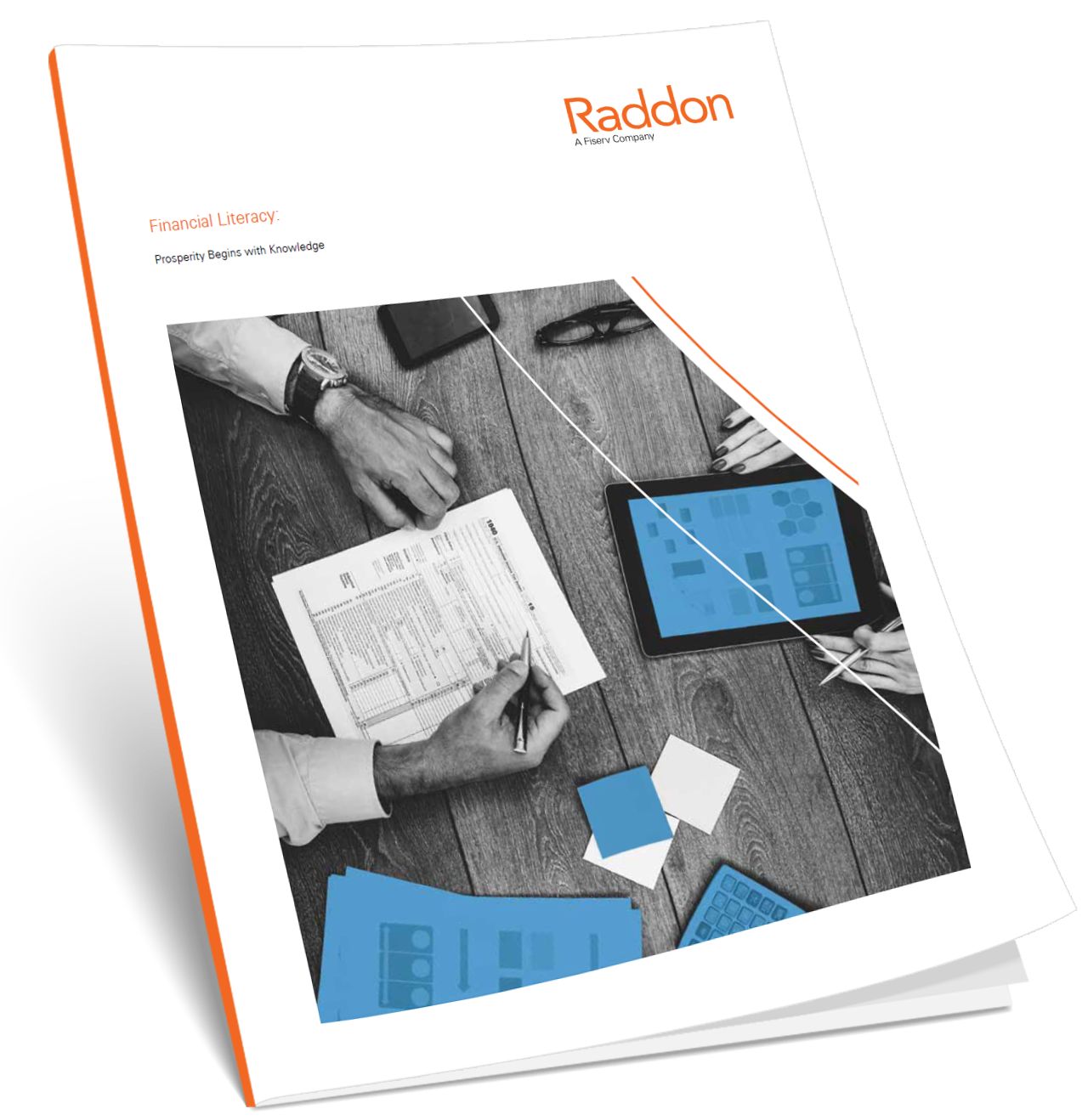
March 28, 2018 | Caroline Vahrenkamp
Tapped Out: The Impact of Student Debt
Access to loans for education has allowed a generation of students to achieve a higher level of education than any generation in history. Yet those same loans have stifled that generation’s perceived ability to move forward in life.
In this 20-page study, Raddon explores the demographics of our nation’s student debt holders. Insights from this study look at generational spread, type of degree sought, and student debt’s impact on credit and borrowing. Learn about the ways that servicing student debt has held back many borrowers from moving forward with other life events, especially as they cope with a subpar job market.
Price: $500

February 26, 2018 | Lynne Cornelison
Effectively Serving the Hispanic Market
Today’s Hispanic/Latino population is the largest minority population in the United States. Hispanic origin individuals account for almost one out of every five individuals in the United States. As the U.S. continues to become more racially and ethnically diverse, financial institutions need to recognize that the Hispanic/Latino population is not homogeneous.
In this 48-page study, Raddon brings to light the perspectives, behaviors, and financial goals of the U.S. Hispanic consumer. Findings from this study will help financial institutions build their messaging and offerings for this key segment of the population, thus increasing their capacity to serve Hispanic/Latino consumers effectively and efficiently.
Price: $2,000

February 5, 2018 | Greg Ulankiewicz
Lending Insights: Loan Demand Rebounds but Challenges Persist
As the nation continues to recover from the recession of 2006–2009, the demand for loans has started to increase, though the landscape has changed a bit. The types of loans consumers anticipate using is shifting from cars and mortgage refinance – both of which dominated during the recovery – to credit cards, equities and purchase mortgages. And while consumers’ desire and ability to borrow is increasing, factors such as an uneven housing recovery and student loan debt may lessen their actual capacity to borrow.
Raddon’s 52-page Baseline Loans Study highlights the emerging loan opportunities – and the persisting challenges – for financial institutions as the populace senses improved conditions, demonstrates greater optimism and displays a hopeful desire to finally emerge from its protracted stage of personal and financial idleness.
Price: $1,000

January 22, 2018 | Marcus Rothaar
Small Business Insights: Technology Fueling Growth
As financial institutions continue in their efforts to attract new clients and keep their current customers, they should be careful not to overlook small businesses. With small business sales, profits, and hiring numbers on the rise, this segment may be in the market for products and services to help them maintain and grow their companies. Financial institutions that understand the needs of these potential clients and gear their messaging and offerings to them may be able to earn their business.
In this comprehensive, 68-page Research Insight Study, Raddon explores 1,200 small business decision makers and their perceptions, preferences, and intentions in what they are looking for in a financial institution—including accounts, services, loans—and how they’re likely to use them.
Price: $1,000

January 15, 2018 | Randy Sager
Deposits Insights: Still Waiting for Rising Rates
Beyond the impact of new technologies on consumer behavior, economic and market conditions have changed consumer attitudes toward saving and investing, prompting financial institutions to adapt their offerings as well. Raddon Research Insights explores consumer savings and investment behavior to help financial institutions pinpoint current sales and revenue opportunities.
Within this wide-ranging, 52-page Research Insight Study, Raddon Research Insights finds both slight and significant changes in insured deposit, investment and retirement product usage over the past 10 years. Read on to learn more about today’s deposit product environment.
Price: $1,000

January 8, 2018 | Lynne Cornelison
Payments Insights: Rise of the Digital Pioneers
Financial consumers are a diverse group, and determining what they need and want is one of the biggest challenges facing today’s financial institutions. Focus too closely on Traditionalists, who may prefer face-to-face interactions with a bank teller at a local branch, and you might lose the Millennials who want the ability to deposit checks via an app on their smartphone. Play up your online banking features and those who prefer to pay by check could take their business elsewhere.
Read this 53-page Research Insight Study, to learn how Raddon examines consumer payment channel usage and service, along with the ways financial institutions can effectively engage their customers, both through technology and the branch.
Price: $1,000

November 6, 2017 | Caroline Vahrenkamp
Generation Z: The Kids Are All Right—How High Schoolers Perceive Financial Needs and Opportunities
As the Millennial generation has matured they have captured the ongoing interest of financial service providers, often overshadowing other generations. Members of “Generation Z” (born starting in the year 2000) will soon step into the spotlight as they begin to enter adulthood and take on financial responsibility. As today’s children grow into tomorrow’s young adults, banks and credit unions that understand them and how they want to move and manage money will be able to create strategies and tactics to capture their business.
In this 44-page study, Raddon brings to light the perspectives, behaviors, and financial goals of the Gen Z consumer. Findings uncovered in this study will ultimately help financial institutions build their messaging and offerings for this segment, thereby increasing their ability to serve these consumers effectively and efficiently.
Price: $2,000
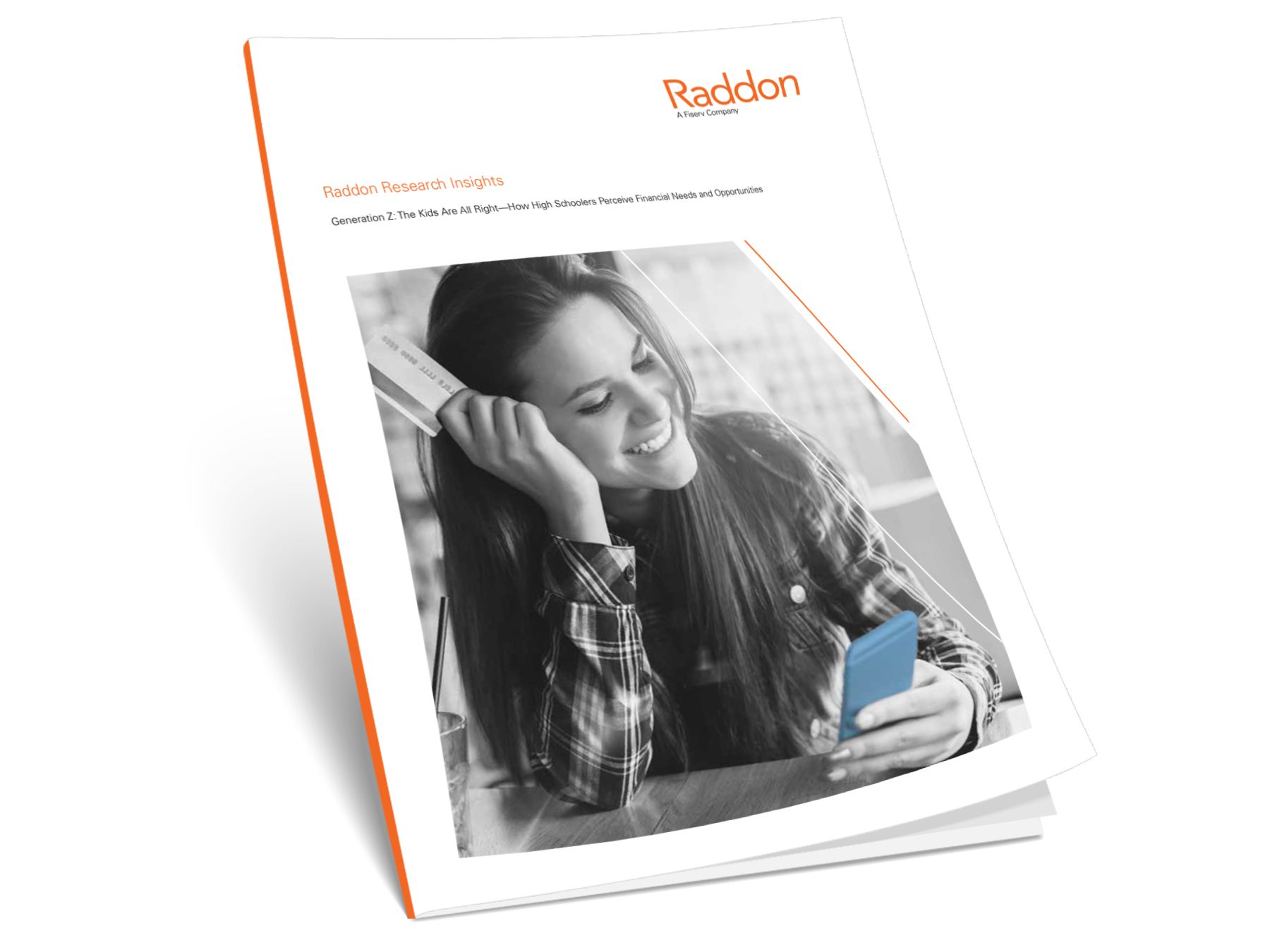
September 14, 2017 | Caroline Vahrenkamp
Life after Overdraft: Profitably Serving the Mass Market
Regulatory, technological, and cultural forces have united to drive overdraft income downwards. Many financial institutions have relied on this fee income to bolster their revenues or to allow them to offer free checking and other products for the mass market. With that fee source drying up, many institutions are asking whether they can serve the mass market at all.
In this 50-page study, Raddon explores the perspectives, behaviors, and financial goals of these mass market households. Deep dive insights uncovered in this study will ultimately help financial institutions build their messaging and offerings for this segment, thereby increasing their ability to serve these households effectively and efficiently.
Price: $2,000
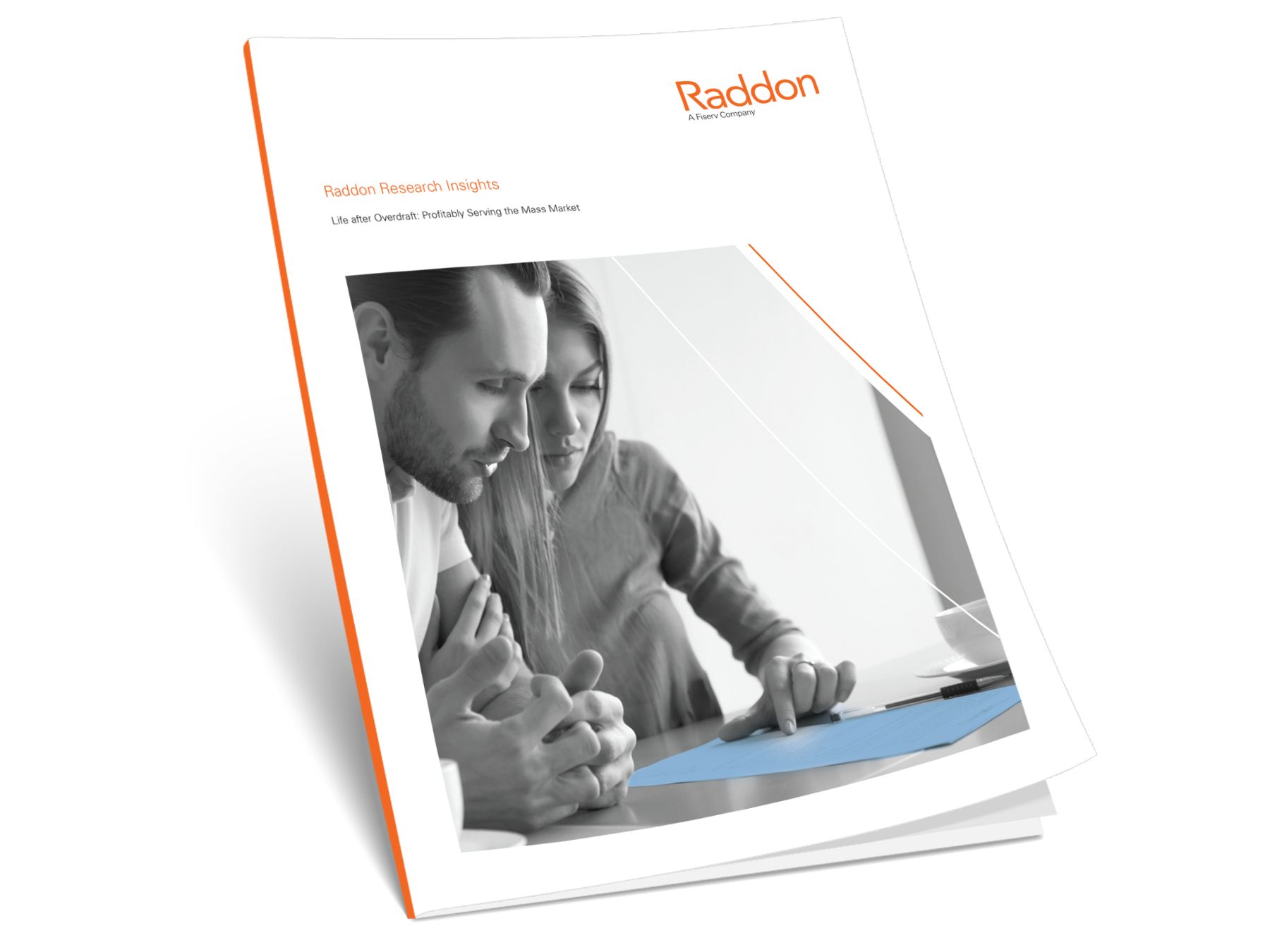

Want to ask us a question?
Interested in our services?
We’re here to help.
2900 Westside Parkway
Alpharetta, GA 30004
© 2025 Fiserv, Inc., or its affiliates.